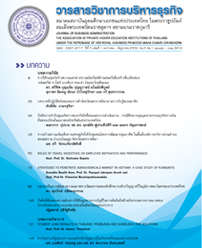STUDENT LOAN DEFAULTS IN THAILAND: PROBLEMS AND GUIDELINES FOR SOLUTIONS
Keywords:
Student Loan Fund, Defaults, Problems, Solutions, เงินกองทุนให้ยืมเพื่อการศึกษา, การผิดนัด, ปัญหา, การแก้ไขAbstract
The purpose of this research is to study the causes of Thai Student Loans Fund (SLF) defaults, analyze problems and their effect on the stakeholders, and guidelines for solutions. This is a documentary research with data collected from previous researches, articles, news, and other published materials from 1995-2014 and was analyzed by using inductive analysis. The research findingsrelated to the causes of defaults for repayment of SLF were: (1) Unethical mind of student debtors who intended to default.(2) Personnel in Financial Aid & Scholarship Divisionsof high vocational schools and universities involved with screening and granting loans are dishonest and do not strictly conform to the rules andpolicies, coupled with commercial concentration of institutions. (3) Lack of updated and complete data base of borrowers, lack of systematic and proper information pool.(4) Inefficiency in not only procedures and policies of allocation and distribution of SLF but also in the systemsused in collecting the loan repayments. The guideline solutionsare: (1)Inculcating sense of ethics and moral to student borrowers by educate them with ethics course and ethics training to convey knowledge and understanding of the policies and procedures in using the funds and strictly repayment of loans, awareness of the strong punishments in monetary and non-monetary terms; (2) Characteristics of implementing agencies with the right organizational structure: less bureaucracy with professional workers, open communication, leadership, teamwork, organizational culture, strategic plan, monitoring and public performance evaluation plan; (3)Proper and systematic procedure in repayment of loans which areaccurate, updated, verifiable data pool among granter, employer, revenue department, debt collector, and educational institutions.
การผิดนัดชำระเงินกู้ยืมเพื่อการศึกษาในประเทศไทย : ปัญหาและแนวทางในการแก้ไข
วัตถุประสงค์ของงานวิจัยนี้เพื่อศึกษาสาเหตุของปัญหาการผิดนัดชำระหนี้ ผลกระทบ และแนวทางการแก้ไขปัญหาเงินกองทุนให้กู้ยีมเพื่อการศึกษา การวิจัยนี้เป็นการวิจัยเอกสาร ศึกษาค้นคว้า การวิเคราะห์แบบอุปนัย จากงานวิจัย ข่าวสาร วารสารและสิ่งตีพิมพ์ที่เผยแพร่ ในช่วงระหว่างปี พ.ศ. 2538-2557 ผลการศึกษาพบว่าสาเหตุของการผิดนัดชำระหนี้เงินกองทุนให้กู้ยีมเพื่อการศึกษาเกิดจาก(1)การไร้ศีลธรรม จริยธรรมของผู้กู้ มีเจตนาเบี้ยวหนี้ (2)การคัดกรอง และการจัดสรรเงินให้กู้ยืมแก่นักศึกษาของหน่วยงานด้านการช่วยเหลือทางการเงินและทุนการศึกษา ปฏิบัติหน้าที่โดยขาดความซื่อสัตย์ ไม่เคร่งครัดตามกฎ ระเบียบ ข้อบังคับแต่มุ่งเน้นผลในเชิงพาณิชย์แก่สถาบันการศึกษาเป็นหลัก (3) ขาดข้อมูล และฐานข้อมูล ที่ครบถ้วน ทันสมัย อันนำไปสู่ปัญหาการติดตาม รับชำระหนี้ และความผิดพลาดในการสื่อสารของสารสนเทศ (4) การขาดประสิทธิภาพในกระบวนการ นโยบาย การจัดสรร คัดสรร การแจกจ่าย ระบบการติดตามทวงหนี้ และการชำระหนี้ของกองทุนให้ทุนกู้ยืมเพื่อการศึกษาแนวทางในการแก้ไขปัญหา คือ(1)การสอน การอบรมศีลธรรม และจริยธรรมเพื่อเป็นการ ปลูกฝัง และสร้างจิตสำนึกให้นักศึกษาผู้กู้ โดยให้ความรู้สร้างความเข้าใจ และหน้าที่ที่ต้องชำระหนี้เงินกู้ การรับรู้ ตระหนักถีงผลกระทบ รวมทั้งบทลงโทษทั้งในรูปแบบทางการเงิน และรูปแบบอื่น (2) ความเหมาะสมของคุณสมบัติบุคคลากรในหน่วยงานเงินกองทุนฯ มีความรอบรู้ มีความสามารถ ในการปฏิบัติหน้าที่อย่างมืออาชีพ มีประสิทธิภาพสูง ปราศจากการบริหารจัดการที่มีพิธีการมากเกินไป การทำงานเป็นทีม มีวัฒนธรรม มีวินัย มีระเบียบแบบแผน ทำงานอย่างเป็นระบบสามารถตรวจสอบและติดตามผลได้ (3) มีกระบวนการขั้นตอนการรับชำระเงินกู้ที่ชัดเจน เหมาะสม มีความถูกต้อง ทันเวลา และมีฐานข้อมูลที่สามารถติดตามผลได้อย่างเป็นรูปธรรม และเป็นปัจจุบันจากผู้ที่เกี่ยวข้องฝ่ายกองทุนนายจ้าง กรมสรรพากร ผู้รับชำระหนี้ และสถาบันการศึกษา
Downloads
How to Cite
Issue
Section
License
บทความที่ลงตีพิมพ์ในวารสารวิชาการบริหารธุรกิจ สมาคมสถาบันอุดมศึกษาเอกชนแห่งประเทศไทยต้องเป็นบทความที่ไม่เคยได้รับการตีพิมพ์เผยแพร่ หรืออยู่ระหว่างการพิจารณาตีพิมพ์ในวารสารอื่นๆ การละเมิดลิขสิทธิ์เป็นความรับผิดชอบของผู้ส่งบทความโดยตรง


